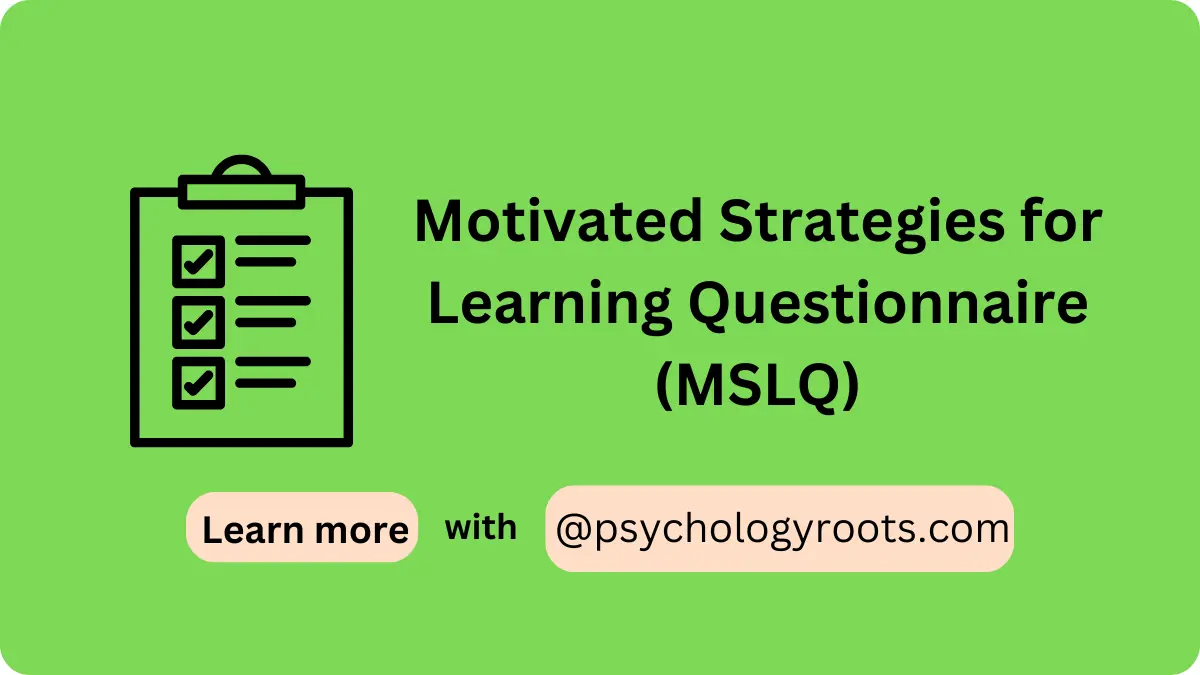Table of Contents
Motivated Strategies for Learning Questionnaire (MSLQ)
Here in this post, we are sharing the “Motivated Strategies for Learning Questionnaire (MSLQ)”. You can read psychometric and Author information. We have thousands of Scales and questionnaires in our collection (See Scales and Questionnaires). You can demand us any scale and questionnaires related to psychology through our community, and we will provide you with a short time. Keep visiting Psychology Roots.
About Motivated Strategies for Learning Questionnaire (MSLQ)
Scale Name
Motivated Strategies for Learning Questionnaire (MSLQ)
Author Details
Pintrich, P. R
Translation Availability
Not Sure

Background/Description
The Motivated Strategies for Learning Questionnaire (MSLQ) is a self-report tool designed to assess motivation and learning strategies in educational settings. Developed by Pintrich and de Groot (1990), the MSLQ is a widely-used instrument that evaluates students’ motivational orientations (like intrinsic motivation, extrinsic goal orientation, and task value) and learning strategies (such as cognitive and metacognitive strategies) that are associated with successful academic performance. Primarily intended for college students, this tool provides educators with insights into the motivational aspects that drive learning and the strategies students employ to achieve their academic goals.
The MSLQ is structured into two main sections: the Motivational Section and the Learning Strategies Section. The Motivational Section gauges attitudes towards learning, self-efficacy, and goal orientation. Meanwhile, the Learning Strategies Section examines approaches to organizing and processing information, managing time, and self-regulation, which together offer a comprehensive view of students’ learning habits and motivational factors.
Administration, Scoring and Interpretation
- The MSLQ consists of 81 items rated on a 7-point Likert scale, with responses ranging from “not at all true of me” to “very true of me.” Each item is aligned with one of several scales under either the Motivational or Learning Strategies sections.
- Students respond to each item based on their perception of their own motivations and strategies. The questionnaire can be completed within 20-30 minutes, and can be administered in either a classroom setting or as a take-home activity.
Reliability and Validity
- Reliability: The MSLQ has demonstrated high internal consistency across various subscales, particularly in its motivation and cognitive strategy sections, making it a reliable measure for evaluating student motivation and learning approaches.
- Validity: The MSLQ has been validated across different educational contexts, with studies consistently supporting its accuracy in measuring motivation and learning strategies as distinct but related constructs influencing academic performance. The tool’s validity has also been backed by its alignment with theoretical models of self-regulated learning.
Available Versions
81-Items
Reference
Pintrich, P. R., & de Groot, E. V. (1990). Motivational and self-regulated learning components of classroom academic performance. Journal of Educational Psychology, 82(1), 33–40. https://doi.org/10.1037/0022-0663.82.1.33
Important Link
Scale File:
Frequently Asked Questions
What is the purpose of the MSLQ?
The MSLQ assesses students’ motivations and learning strategies to better understand their academic behaviors.
How can educators use the MSLQ results?
Educators can use MSLQ results to identify areas where students need support in motivation or strategy development and to tailor interventions accordingly.
Is the MSLQ suitable for all age groups?
While designed for college students, adaptations may allow use with high school students, though lower-grade students may need a simpler version.
Can the MSLQ predict academic success?
It can indirectly predict academic success by highlighting key motivational and strategic factors that influence learning.
How long does it take to complete the MSLQ?
The MSLQ generally takes 20-30 minutes to complete.
Disclaimer
Please note that Psychology Roots does not have the right to grant permission for the use of any psychological scales or assessments listed on its website. To use any scale or assessment, you must obtain permission directly from the author or translator of the tool. Psychology Roots provides information about various tools and their administration procedures, but it is your responsibility to obtain proper permissions before using any scale or assessment. If you need further information about an author’s contact details, please submit a query to the Psychology Roots team.
Help Us Improve This Article
Have you discovered an inaccuracy? We put out great effort to give accurate and scientifically trustworthy information to our readers. Please notify us if you discover any typographical or grammatical errors.
Make a comment. We acknowledge and appreciate your efforts.
Share With Us
If you have any scale or any material related to psychology kindly share it with us at psychologyroots@gmail.com. We help others on behalf of you.